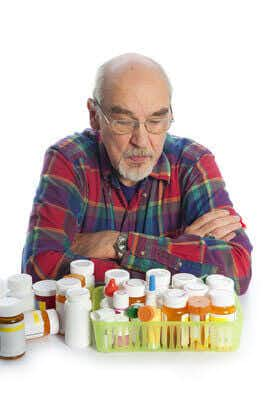
Many senior citizens may be taking the wrong medicines. Those who can least defend themselves-those with cognitive difficulties or dementia-may be running the greatest risk.
Are People with Dementia Being Given the Wrong Medicines?
A study from Europe reveals that many older people with dementia are prescribed inappropriate medications (Renom-Guiteras et al, Age and Ageing, Sept. 1, 2017). More than 2,000 individuals were assessed. Roughly 60 percent of them were taking at least one unsuitable drug. Over one fourth were getting two or more such medicines.
Which Medicines May Be Inappropriate?
These drugs include powerful acid suppressing drugs called proton pump inhibitors, antipsychotic medicines, sedatives and sleeping pills, particularly benzodiazepines. People in long-term care facilities appear to be at greatest risk for receiving inappropriate medications.
Older people are at risk for the wrong medicines in the US as well as in Europe. A few years ago we got this question from a reader:
Is Mother Being Overmedicated?
Q. My mother has always been active but lately she seems to be fading. She complains about insomnia and dizziness.
Her doctor recently prescribed bupropion and she had horrible side effects: trembling, heart palpitations, double vision, weakness and constipation. As a result, I think, her insomnia trouble was exacerbated.
Her doctor did not believe the drug could be causing these problems, but he prescribed lorazepam to help her sleep. (It doesn’t help much.)
She takes simvastatin for high cholesterol, baby aspirin for her heart and Tylenol for joint pain. She is also on clorazepate for anxiety.
My main concern is whether my mother is being overmedicated. Do you have any information on how these medicines would affect an older person?
Are These the Wrong Medicines for an Older Woman?
A. The antidepressant bupropion can cause agitation along with the other symptoms your mother has experienced, including the insomnia. Prescribing a medication to treat the side effects rather than changing the medication causing the problems doesn’t make much sense to us.
Benzodizepines and Dementia:
We are particularly concerned about her taking two benzodiazepines (lorazepam and clorazepate), since these could contribute to dizziness and unsteadiness and are usually inappropriate for the elderly. An important study found that mature people taking benzodiazepines are at elevated risk of Alzheimer disease (Billioti de Gage et al, BMJ, Sept. 9, 2014). Conversely, as Alzheimer disease worsens, people are more likely to be prescribed benzodiazepines, presumably to calm them down (Tormalheto et al, International Psychogeriatrics, Oct. 2017).
Our Guide to Drugs and Older People provides information on many more drugs that can be dangerous for those over 65.

